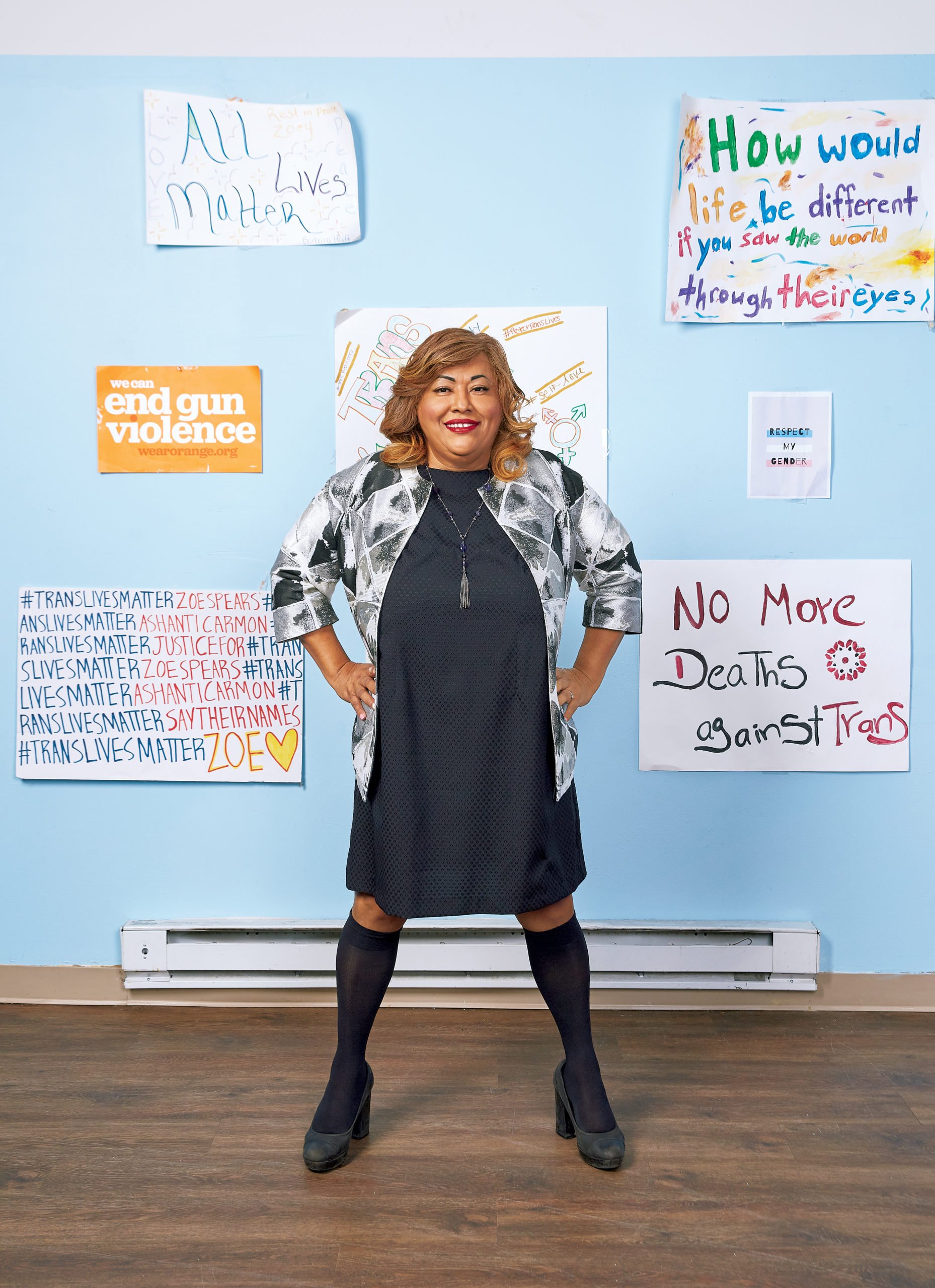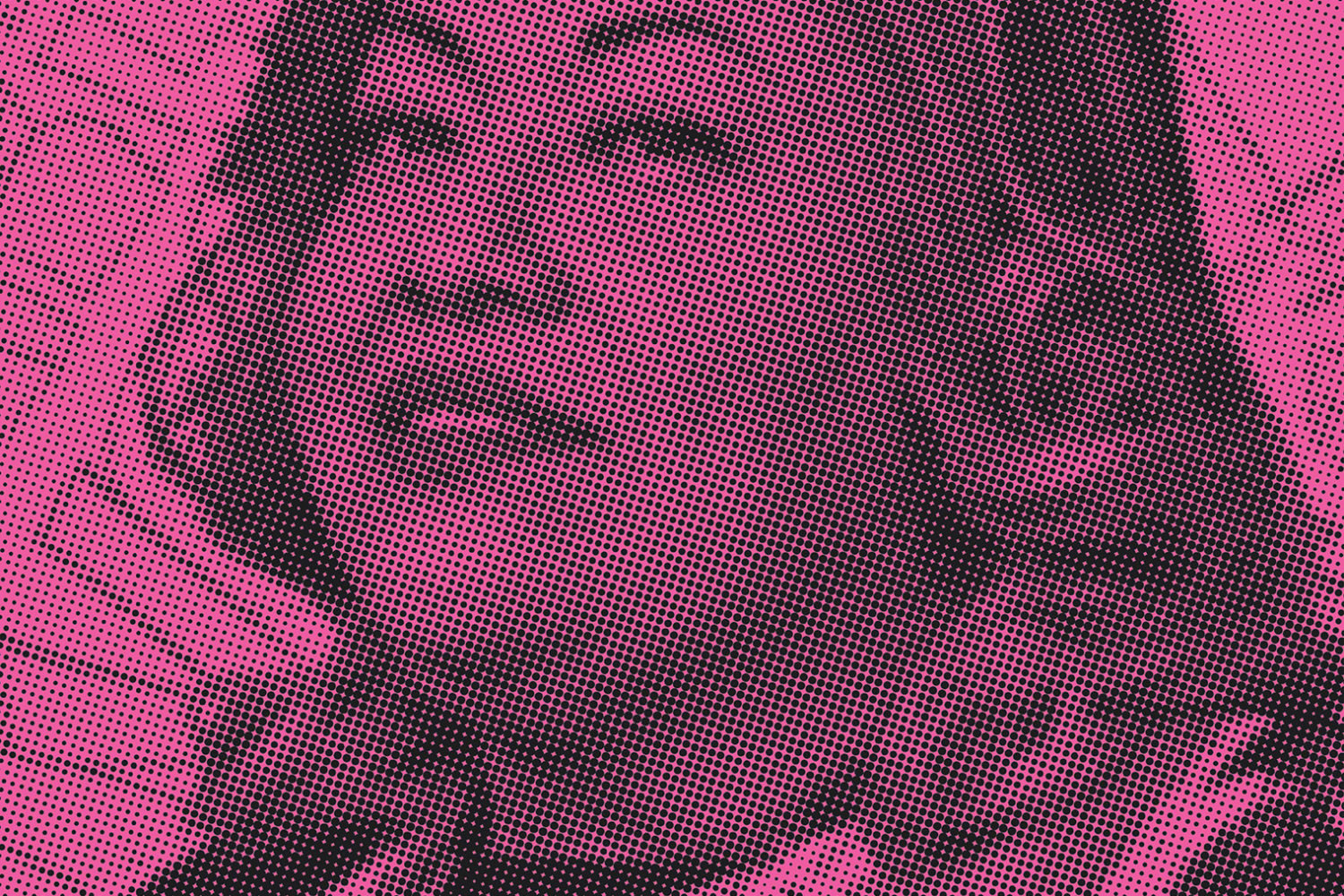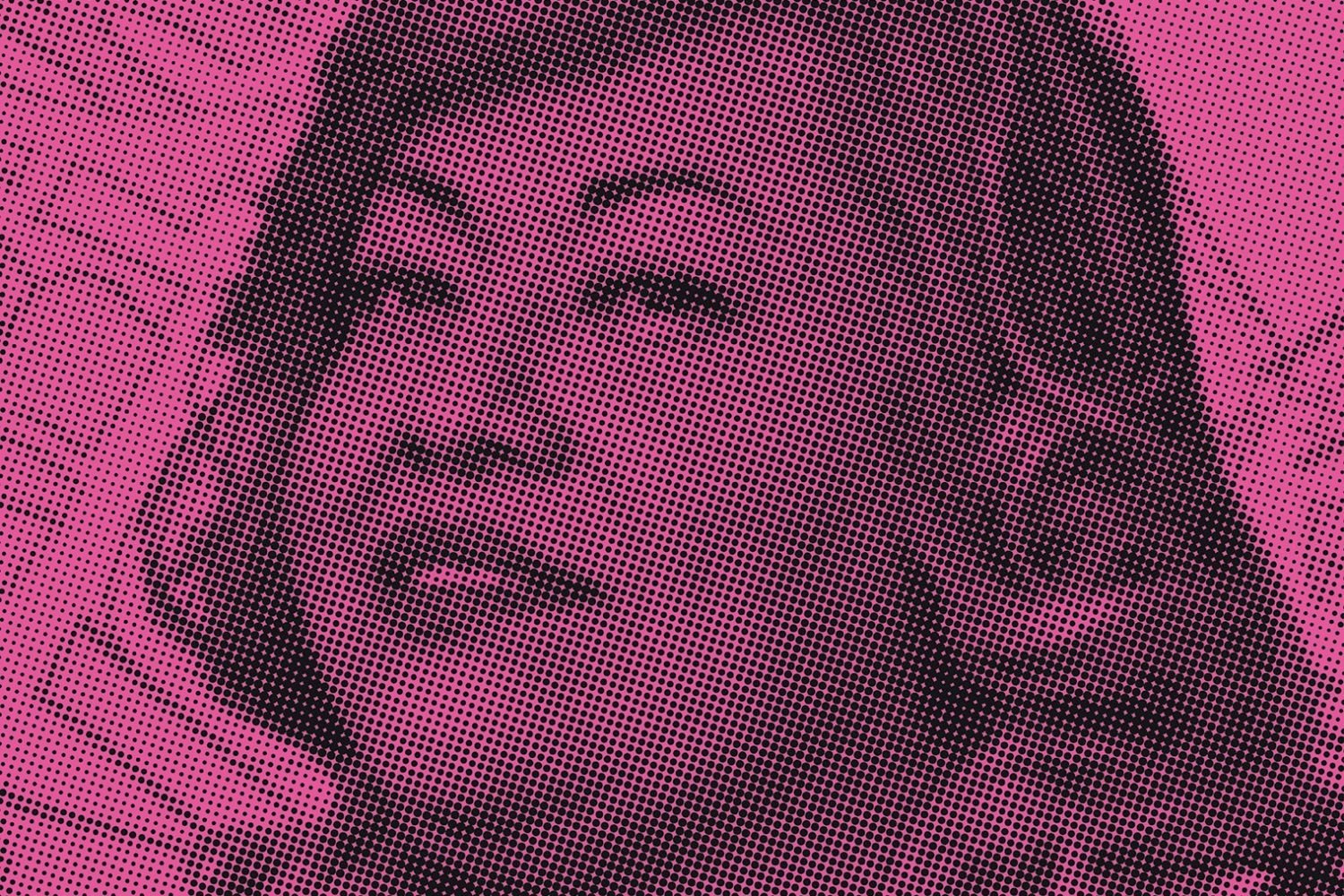Nellie’s, the popular LGBTQ sports bar on U Street, has been under fire for the last month. It started when a video of Keisha Young, a 22-year-old Black woman, being dragged down the stairs by her hair during Pride Month went viral on social media, prompting the bar to temporarily close and weekly protests to occur on Friday nights in front of the establishment. The case was then forwarded to the DC Attorney General, who will decide whether to pursue charges against the bar.
Owner Douglas Schantz quietly reopened the bar last week, and a Friday Facebook post announced Ruby Corado was hired as the manager and Director of Community Engagement. Corado, who has 30 years of activism experience in DC, is the executive director of Casa Ruby, which aims to create “successful life stories” for transgender, genderqueer, gender non-confirming, gay, lesbian and bisexual people. It marks an interesting turn for Corado, a trans woman from El Salvador, who despite being lauded for her work with trans youth on the cusp of homelessness also has significant experience working with pricey DC eateries.
Q: Can you start by telling me about this job? When do you start? Is it full-time? A permanent position?
I started Friday. I own a consulting firm that focuses on cultural sensitivity training and conflict resolution. The owner reached out to me because I have worked with other establishments. I worked with a restaurant called Cuba Libre. I worked with Clyde’s. I worked with charter schools. I’ve done a lot of work on sensitivity training and inclusion. My firm focuses on supporting individuals. Part of the firm also does leadership, and as an older leader, I wanted to use this consulting firm to elevate new leadership. I have a training institute where I use what I learned in the 30 years that I’ve done this work. I will be working on the process, and I have two Black trans women who are also working with Nellie’s.
Q: Can you tell me a little bit about what the sensitivity training and inclusion training is like? What is the takeaway?
We discover people’s bias. A lot of sensitivity training is focused on getting people to discover their own bias, and then also helping them understand policies that businesses and organizations develop to be culturally sensitive. A lot of it is helping the staff understand: what are my views on this? How do I feel about this? And then educating them about the policies of each company. Cultural sensitivity training means working with owners to make assessments. Is your company really inclusive? Is your company really guided by principles that include everyone? I think most companies do that because I have seen, in the last 30 years, companies develop non-discrimination policies, develop good mission statements and anti-discrimination statements, but they do not put them to work with contractors. What I’ve seen a lot in DC is the contractors very often are not fully trained or versed on these policies. In general, it’s basically getting people to understand the laws. In the District of Columbia, it is illegal to discriminate against protected classes. Part of the training is based on some aspects of law. In general, it is designed to help people understand the impact of their bias.
Q: Who at Nellie’s will be part of this training?
Everybody. Every employee, every contractor [and the owner] is going to attend the first training this week. We already have it on the calendar. I have mandated that everybody, even occasional contractors need to be on this. I tend to be very to-the-point. When I spoke to the owner, I did a mini assessment. I wanted to know if this person is going to be able to work with me. When it comes to my professionalism, I don’t associate my name with people or things that I don’t believe in. One of the first things I asked him was, ‘How do you feel about the demands?’ He said, ‘I am all for them and figuring out ways to communicate.’ That was a good start for him. He’s looking at them. Off the ground, I said, ‘I need you to start supporting Black-led organizations.’ … It’s those little things. I do know him. When I met with him at the restaurant, yes, there are a lot of things that are going to change. I want the place to be aesthetically welcoming. I talked to the staff, many of whom are people of color. I asked about Keisha’s case. I wanted to make sure that the person who did this to her is in jail. He agreed with me. It’s those little things that I want.
As the days have gone by, he agreed to do a scholarship for a young artist. I’m hoping that he will focus on the marginalized. I can’t ask for the world. He’s going to be doing a scholarship fund for young artists from the neighborhood. There’s a lot of violence going on in that neighborhood. I think a lot of it comes from people not feeling part of this community. He agreed to that. This is one thing that came from him, he said he wants to do a mural. He said, ‘I’ve been thinking about doing a mural that represents the neighborhood.’ I said it needs to be a Black artist. Part of what I heard in people’s frustrations is they have not been able to express themselves. There’s going to be a big, long mural, and there’s going to be a contest. … You’re contracting, and right now, I’m getting to know you. There may be something in the future where we bump heads. I always say that I give people the benefit of the doubt. That’s how I operated my whole life. Many people have disappointed me, including leaders of this city who came to me and said we’re going to help vulnerable communities, and they went missing in action. I’m not saying that’s not going to happen with him, but right now he’s okay.
Q: Just so I understand, is this a full-time, permanent position, or is this contractual?
I have a contract with him. I gave him a contract for six month. He wants me to be there all the time, but I want to see. The main reason why I want to do this work is because I heard people who said we have not been heard. ‘He’s not talking to us.’ Some of the protestors said he’s not talking to us. I approached him, and I said, ‘Why?’ One of the things he said is, ‘I want to, that’s why I want you here.’
In general, the ultimate goal why I joined is if people are saying we’re not being listened to and he reached out to me and said I want to, I saw that as an opportunity to address a bigger issue that’s in my heart, and that is the violence that queer people of color feel when they navigate this city. I recognize that this opportunity will engage many conversations where we can really talk about what is an inclusive place for people of color in DC. It began with the LGBTQ community, but there will be other spaces that say are we addressing non-LGBTQ people? And I truly believe, me the dreamer, that we will engage in enough conversations in a city that currently, and every year, gets more violent.
What I also see, and I really thought about this, what happened to Keisha is the result of a system that validates violence against women, and it really is not just at Nellie’s. Every day women are violated. I have literally, a big part of my life, dedicated to addressing violence, so I see this as an opportunity to, maybe with my small contribution dealing with an issue that is very delicate, that we can really influence. As part of the community engagement, I want to engage with the neighbors. I want to talk to people beyond Nellie’s. I want to talk to other businesses. What are you doing to invest in the needs of the people of this neighborhood?
A lot of people talk about gentrification in our town. I saw this as an opportunity to talk privilege. What are you doing with your privilege? Are you really engaging? Do you really use your privilege to [create] change? I really want to utilize what I learned in 30 years to help the people that said they’re not heard. I already spoke to 25 people from the community. I reached out to the protestors. I want to listen because that’s what I’ve done my whole life in this town. I’ve talked to a lot of BLack queer people, and some of them did say some things I want to implement, and that is we want to see less violence on the block.
Q: Before you got involved, how have you felt watching what’s happened at Nellie’s over the last month?
I’ve seen this happen before. I work with a girl who was dragged out of a bar on 20th. I dealt with the issue when a handicapped trans woman was dragged out of a place on H Street. I’ve dealt with this a lot. When I got the details, I said you know what, another contractor. It’s usually contracted people. I have seen places that need to improve on some things, but most of the barbarian situations do take place by people who don’t have training, who don’t know. You have a lot of people who don’t even know the law. You get people who come to work in DC and mistreat people because they are not aware of the law. When I saw the situation, I was pissed. I was glad she was taking legal action. I was horrified. I was like, ‘Oh my god.’ And he shut down the place. I was like good, you did what you needed to do. What I see is him learning. As for me, I want lots of other people in this town to learn from what happened at Nellie’s. People need to understand that there’s impact to actions that take place in a public accommodation. He’s promised me that he will hire Black trans women. I want positive things to come out of that. I would not be doing this if I didn’t think that something positive will come.
Q: Prior to your involvement, had you spent any time at Nellie’s as a patron, and what were your opinions?
Yes. I have a lot of donors who had events there as fundraisers for Casa Ruby. Our staff, and this is not just me, were regulars there. A lot of the Black trans women were regulars there because they invited us. I can only speak for the staff because that is who we interacted with. I did express that I don’t want to say our experience minimizes what happened to Keisha, so I really don’t want to focus on that. There’s a part of me that I want everybody in this town to have the experience that Ruby Corado has when I got into a place. But I don’t want to minimize the fact that what happened to Keisha should’ve never happened to anybody. No one should have to experience that.
Q: In this new role, what are your first steps, and what are your long-term goals?
My first step was to listen. That was my first step. That’s why I talked to 25 people from the community. I reached out to protestors. I have made recommendations to the owner. I’ve made four recommendations, which I’ve described to you. What I’m hoping is that we will speak on change.
Long term, especially in the role of community engagement, I hope to be able to work with the community so we learn about violence: violence against women, violence against trans women, violence against queer people of color. This is something I told him before, I said, ‘You need to become an advocate.’ I’ve done work on anti-violence for a very long time, but I know many times I don’t have access to people with money. He does. He has access to politicians, and they will listen to him more than they listen to me. I said you need to become an advocate for queer people of color who experience violence. I’m not here just to do that job. I really want him to become an advocate because no one more than him can explain what he has seen after these incidents. He can talk to other restaurant owners, he can talk to politicians. The truth is this is going to happen again somewhere. It may not be in a queer restaurant, but we as a city need to work together, not just the activists. I applaud the activists. It takes more than us who yell and yell and scream for years to create change in this city.
Q: What does Nellie’s need to do to regain the community’s trust, and how will you help achieve that?
He has already began doing something. Number one, he approached the protestors who made the demands, and they refused certain things. Before hiring me, he offered to hire some of the protestors. They refused. I think that he’s already done that, so he’s working.
By hiring a trans woman of color who has 30 years’ experience in community engagement, I think it shows at least he is willing to learn. I really know that this sends a strong statement to the point that on Friday, he opened, there were Black patrons who came in. On Saturday, he had a line outside the door, a lot of whom were Black patrons.
I’m trying to be very careful. I don’t want to disappoint people. I have received dozens of messages, and people who said, ‘Ruby, we know this is not going to be easy, but thank you for taking this on.’ I spoke to 12 of my close friends, all of whom are Black, and I asked them, ‘Should I do this?’ And I spoke to my husband, who is Black, and I said, ‘Baby, should I run away from this?’ He said to me, ‘What do you really want to accomplish?’ I said, ‘I want for us to talk about violence.’ He told me, ‘I don’t feel comfortable bringing my sister to that bar.’ I said, ‘Baby, do you feel comfortable that I can change that place so your sister can come to this bar?’ And he said, ‘100%.’ That’s all I can do.
I do want people to know that yes, I am not trying to speak for the Black community. Never done that. Unfortunately in my career, before there was the Black Lives Matter movement, I was already fighting for the kids, my kids, because they embraced me as their mother. I’m not Black. But that is the approach I am taking to this. I have a platform, and people listen. And if in my platform people feel I can bring some positivity to this conversation and we change how unsafe people feel in spaces around town, I’m going to do that, and I’m going to do that through my consulting firm.


















